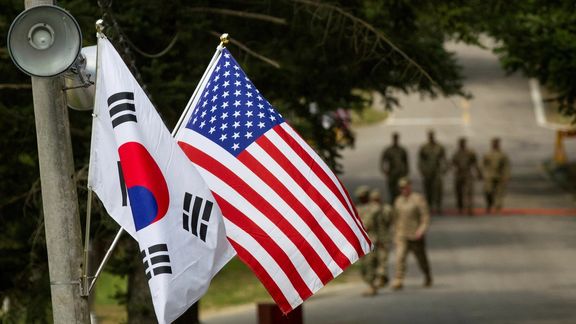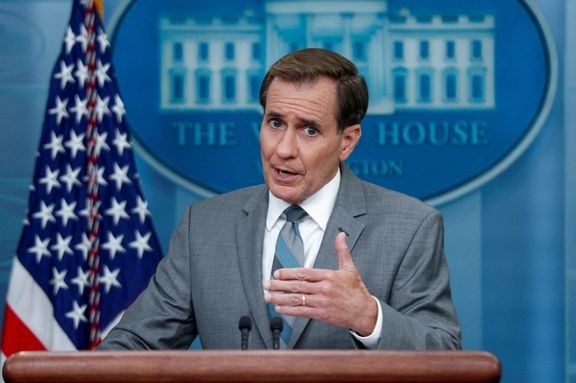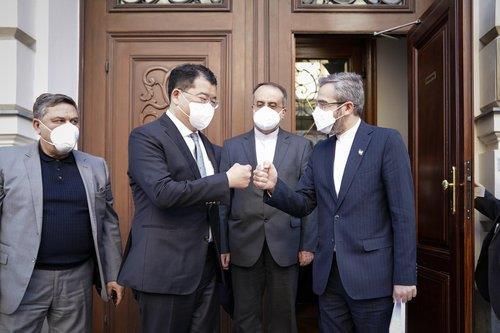Iran Contradicts US, Denying Restrictions On Unfrozen Funds

Conflicting statements regarding the allocation of Iran's unfrozen funds persist between Washington and Tehran, with Iran refuting any imposed limitations.

Conflicting statements regarding the allocation of Iran's unfrozen funds persist between Washington and Tehran, with Iran refuting any imposed limitations.
The White House stressed on Friday that there would be restrictions on what Iran could do with any funds unfrozen under an emerging agreement that has led to the release of five Americans from prison to house arrest in Tehran.
White House spokesperson John Kirby told reporters that the United States would have "full visibility" into where any released Iranian funds are directed and used. An estimated $6 billion in Iranian assets are now held in South Korea.
"Essentially, the funds can only be accessed for food, medicine, medical equipment that would not have a dual military use," he said. "And there will be a rigorous process of due diligence and standards applied with input from the US Treasury Department."
But Iran immediately had a different reaction to the news of the prisoner release deal. “The Islamic Republic will decide how to use the released funds, and these funds will be appropriated for the various needs of the country by the appropriate authorities,” the foreign ministry said in a statement on Friday.
Iranian media on Saturday insisted that the money, which for now is $6 billion held in two South Korean banks, will go into commercial bank accounts in Qatar and the allocation of these funds “will be under the purview of the Islamic Republic and will be used for various needs of the country,” Faraz daily in Tehran reported based on information from government sources.

Control of the Funds
Faraz Daily, a relatively independent website by Iranian standards, said Saturday that the funds will go from South Korea to Switzerland to be converted into euros, and then wired to two banks in Qatar.
This sounds simple and non-controversial. But the report added that after reaching Qatari banks the funds will be transferred to a few accounts opened in Qatar by Iranian banks “so the appropriation of the money can be under Iran’s control.”
The Iranian version of the deal becomes more controversial, as Faraz Daily said that once the euro funds are deposited in the Iranian accounts, the Central Bank of Iran “will have 100 percent full and direct control” on how to appropriate the funds “for essential goods, medicine and other needs.”
If Iran has accepted limitations on its nuclear program for freeing its assets, as media reports indicate, it is to be expected that Tehran will try to deny any US control over the unfrozen funds, mainly for domestic public opinion. However, Kirby’s formulation that the United States will have “full visibility” is vague and different from having a veto power on what Iran spends the funds for.
Here it becomes clear why the funds will be in euros. Washington can control international dollar transactions and be aware of all the details of wire transfers, including the recipients. But in case of euros, the US must mainly rely on information it is given by Qatari banks.
Faraz Daily also said that Iranian businesses can request disbursements of the funds. Most so-called businesses are tied to the Iranian government and the Revolutionary Guard, and the US cannot have full information if sanctioned companies are benefiting from the unfrozen funds being transferred in euros.
While it is clear that a detailed mechanism has been or is being set up for the funds, the Biden administration is not disclosing the full extent of the agreement and the degree to which it will be able to have a say in any inappropriate use of the funds.

Is there a deal to restrict Iran’s nuclear activities?
Fars news agency affiliated with Revolutionary Guard claimed Friday that the agreement with the United States is not “oil for food” program, similar to a scheme imposed on Iraq 1995, when Baghdad could sell its oil but could only import humanitarian needs.
Fars boasted that while during the presidency of Hassan Rouhani the US was offering to free one or two billion dollars in exchange for Iran not to enrich uranium to 20 percent, “now they will free all the blocked funds for the release of prisoners.”
In another report on Saturday, Fars quoted unnamed Iranian officials as saying that the nuclear program is in full swing, “according to existing plans of Iran’s atomic energy agency.” It also claimed that the December 2020 law passed by parliament mandating reduction of IAEA monitoring and higher uranium enrichment is in place and fully adhered to.
On Friday, the Wall Street Journal cited people familiar with the matter as saying Iran has significantly slowed the pace at which it is accumulating near weapons-grade enriched uranium and has diluted some of its stockpile.
Kirby said he could not confirm the report but said "any steps that Iran might take to slow down enrichment certainly would be welcome."
"We're not in active negotiations about the nuclear program," he added. "But certainly those sorts of steps, if they were to be true, would be welcome."
While a significant opposition is emerging in the United States against the release of the funds, an Israeli source, who wished to remain anonymous, revealed to Iran International's correspondent in Israel that the agreement between the US and the regime is not merely a tentative understanding but a comprehensive accord.
Emphasizing that the agreement carries significant ramifications, signaling a shift beyond conventional diplomatic engagements between nations, the source said the Israeli government is concerned about the expansion of the accord, like many other critics who believe the deal would embolden Iran in its hostage taking policy.